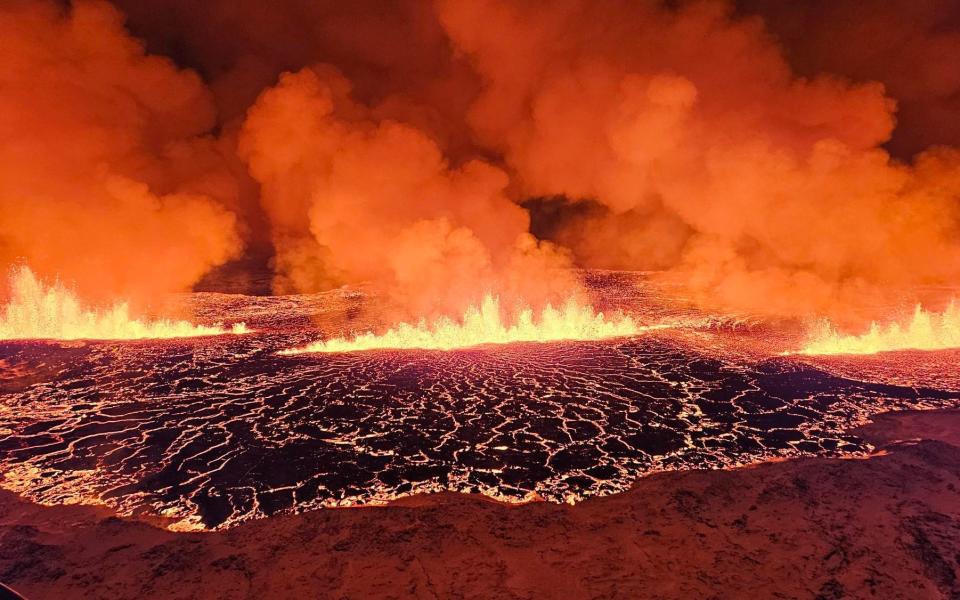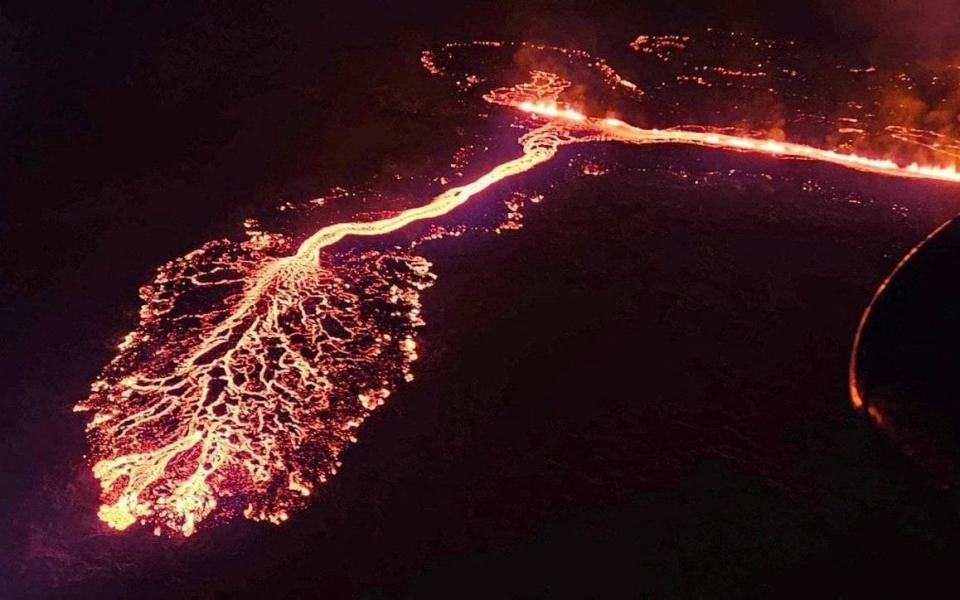Tourists have been warned to stay away from an area in southern Iceland, as a violent volcanic eruption continues on the Reykjanes Peninsula.
The ongoing eruption is located 30km southwest of Iceland’s capital, Reykjavík, close to Iceland’s top tourist attraction, the Blue Lagoon wellness complex and hotels.
The attraction partially reopened on Sunday after weeks of closure due to intense seismic activity in the local area – but was forced to close a day later, when the volcanic eruption began on Monday.
The Blue Lagoon is now closed until December 27, at which point the matter will be addressed. Its website advises: “All guests with confirmed bookings will be contacted in the coming days.”
The nation’s police force raised Iceland’s alert level as a result of the eruption, but there is currently no threat to life as the lava is flowing from Grindavik, the nearest settlement.
However, tourists have been warned to stay away from the ongoing eruption. “This is not a tourist attraction and you have to watch it from a distance,” Vidir Reynisson, head of Iceland’s Civil Defense and Emergency Management, told broadcaster RUV.
On Tuesday, a hotel near the eruption site was advising its guests to keep their windows closed against smoke from the fissure, traveler Jake Turner told X. “I’m in Iceland now, the hotel called every room and told to keep the windows closed. because the volcano is erupting.”
The eruption does not affect flights to and from Iceland, the Icelandic government said on Tuesday.
“There is no disruption to flights to and from Iceland, and international flight paths remain open,” he confirmed.
Online flight tracker flightradar24.com shows planes arriving and departing non-stop at Keflavík International Airport, which is 10 miles northwest of the eruption.
Here’s what you need to know if you’re booked to travel to Iceland – and your rights if you choose to cancel your trip.
Is it safe to visit Iceland?
The FCDO is not currently issuing a travel warning to Iceland. Those heading to the region should “monitor local media for updates and follow the authorities’ advice on travel to the area,” he advises.
Travelers should “check for alerts and advice from: Iceland Meteorological Office, Safe Travel Iceland, Almannavarnadeild Facebook page and Twitter (@almannavarnir).”


I’m in Iceland now – can I come home soon?
That depends on your airline or tour operator. The FCDO is not currently issuing a travel warning to or around Iceland, so your transport provider is under no obligation to restrict your journey, or offer a refund if you choose to go home early. As above, you should monitor the situation through official IMO channels.
If you change your travel plans, you will probably have to pay for the privilege – but if you have a flexible ticket, the fee may be waived. Talk to your airline or tour operator directly, before taking any decisive action.
Should I cancel my holiday to Iceland?
If the FCDO does not change its advice to warn against travel to Iceland, or the area you are heading to, your holiday is likely to go ahead as planned.
If you choose to cancel your holiday, it is unlikely that you will be covered by travel insurance.
Iceland holidays are business as usual at the moment, says Georgina Hancock, Marketing Director of regional specialist Discover the World. “Until now we have had to reorganize a number of itineraries for our clients who were to visit the Reykjavik area including the Blue Lagoon. They are all still traveling but will be visiting other areas in southern Iceland.”
An easyJet holidays spokesman said: “Our holidays are currently going ahead as planned, but we are continuing to monitor the situation closely and, should anything change, we will be in direct contact with our customers.”
Will I be covered by travel insurance if I visit Iceland?
Yes, as long as the FCDO does not warn against traveling to Iceland. If you’re worried, talk to your provider directly – and make sure you keep the “emergency” phone number close by when you’re abroad, in case the situation escalates.
Where is the Blue Lagoon – and is it safe to visit?
The Blue Lagoon wellness complex is currently closed to visitors and will remain so until at least December 27, when the situation will be reassessed, he said in a statement.
The seismic activity is centered on the Fagradalsfjall volcanic system on the Reykjavik peninsula, in southwest Iceland. There have been extensive earthquakes and uplift in Svartsengi, where the Blue Lagoon is located, in recent weeks.
“Magma flows under Svartsengi and the land there is constantly expanding. It’s a new chapter we’re looking at now,” Víðir Reynisson, head of Iceland’s Civil Defense and Emergency Management, told local media last weekend.
The Blue Lagoon geothermal pool, Blue Cafe, Lava Restaurant, Retreat Spa, Spa Restaurant and the on-site Blue Lagoon Skincare store began trading one day before the eruption on Monday night, Sunday, December 17.
The wellness complex in Svartsengi, near Keflavik Airport, had been closed since November 9 due to seismic activity on the Reykjanes peninsula.


How long will the Iceland volcano risk last?
“There has been some discussion, led by the IMO, about this eruption being part of an upsurge in activity that could see years of increased activity,” says Matthew Watson, Professor of Volcanology and Climate at the University of Bristol.
“The evidence for this is that there have been multiple eruptions along the same series of fissures on the peninsula in the last few years, and before that there was a gap of 800 years.”
This eruption could be the start of months of activity, according to Professor Watson: “Looking at previous eruptions in the region, a single eruption usually lasts weeks to months: this is true of all three eruptions most recently on the peninsula, for example. Some eruptions in Iceland can last longer.”
Last month, Iceland’s Civil Protection Agency evacuated residents of Grindavík in the town amid warnings of a “river of magma”, noxious gases and “fire sources” in the area.
Iceland’s main tourist area is the Reykjanes peninsula, home to Keflavik Airport, the country’s busiest air hub, connected to Britain by easyJet, British Airways and other major airlines.
Reykjavík, the capital of Iceland, is located approximately 50km from the volcanic system.
Will the Icelandic volcano affect flights, like the Eyjafjallajokull ash cloud?
An ash cloud from the Eyjafjallajokull volcano disrupted global travel in the spring of 2010, amid concerns that the particles and debris could damage aircraft engines. Commercial flights across Europe were halted for almost a week – leaving 50,000 flights on the ground, and an estimated 10 million travelers stranded.
The disruption lasted for almost a week, causing the highest level of disruption to air travel since the Second World War. Could this new wave of seismic activity lead to similar chaos?
No, because the activity is taking place under solid ground, not under a glacier, says Paavo Nikkola, Research Scientist at the Geological Survey of Finland GTK.
“A volcanic ash cloud like in 2010 is not possible now,” Nikkola told the Finnish broadcasting organization Yle. “Back then, a large explosive eruption under the glacier generated the ash.”
There have been several eruptions in the region in recent years, none of which have affected flights, advises a spokesperson from PLAY, a low-cost airline headquartered at Keflavik International Airport. “Iceland is no stranger to volcanic activity, with three eruptions on the Reykjavik Peninsula in the past two years and no disruption to flights. It has some of the most advanced volcanic preparedness systems in the world to protect the public and is well prepared for all eventualities.
“The Icelandic Meteorological Office, the Department of Civil Protection and Emergency Management, and a team of scientists from the University of Iceland are continuously monitoring the seismic activity localized on the Reykjanes Peninsula for any changes.”
Are flights to Iceland being cancelled?
“There is no disruption to flights to and from Iceland and international flight paths remain open,” the Icelandic government said in a statement.
Online flight tracker flightradar24.com shows aircraft arriving and departing non-stop at Keflavík International Airport, which is 10 miles northwest of the eruption.
Keflavik, the nation’s main airline hub, is linked to Britain by the likes of Icelandair, easyJet and British Airways – and is a key stopover hub for transatlantic flights. The gateway to Reykjavík, the nation’s capital is a 50-minute drive away.
“I do not think so [the eruption] it will have a huge impact on air traffic,” Thor Thordarson, a professor of volcanology and petrology at the University of Iceland, told Bloomberg on Monday. “But this could have a serious and significant impact on local communities and their infrastructure includes the town of Grindavik, the Blue Lagoon and Svartsengi.
In recent weeks, airlines have told Telegraph Travel that they are “closely monitoring the situation”. Last week, a spokesperson for easyJet revealed: “Our flight schedule is currently operating as normal, but we are monitoring the situation closely and if the situation changes, we will contact customers directly to advise on their flights.”
A British Airways spokesman said: “Our flights are operating as planned and we continue to monitor the situation closely. We will be in direct contact with customers if the situation changes.”
PLAY Airlines has also confirmed that they will contact customers whose flights may be affected. An airline spokesman said: “[PLAY] is continuously monitoring the situation with the Icelandic government and the Meteorological Office and will provide timely updates via email and text regarding any significant developments that may affect flights.